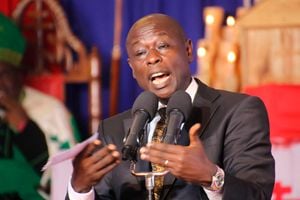State nets Sh27 billion from housing levy amid legal gaps

Housing PS Charles Hinga addresses a press briefing on the housing levy at State House, Nairobi flanked by State House spokesperson Hussein Mohamed.
Employers and employees paid out Sh26.8 billion under the mandatory housing development levy in the six months ended December amid legal hitches that threaten to stop the controversial contribution.
Disclosures by the Parliamentary Budget Office (PBO), which advises lawmakers on the economy and budget show the State Department for Housing and Urban Development had collected the amount against the Sh63.2 billion that the State targets to net by the end of the financial year ending June 2024.
At Sh26.8 billion, the government is averaging collections of Sh4.47 billion per month against the budgeted Sh5.26 billion, translating to a performance rate of about 85 percent from the compulsory levy that has now been suspended by the courts.
Both employers and employees were remitting 1.5 percent of gross salary under the housing levy that the government said will be used in the development of affordable housing and associated social and physical infrastructure and affordable home financing.
The High Court in November declared the levy unconstitutional but allowed the government to continue collecting it until January 10 to allow the State time to appeal. The Court of Appeal on January 26 stopped the State from carrying on with the collections and Parliament has announced the intention to appeal the matter at the Supreme Court of Kenya.
PBO, in the financial and economic analysis of the Affordable Housing Bill 2023 that seeks to provide a legal framework to the levy, notes that the bill has several key gaps but warns that the government will be exposed to legal risks given the many contracts it had already signed.
“If the current status is not addressed and the levy remains nullified, the government will be exposed to fiduciary risks due to the contractual obligations it has already entered with property developers for the ongoing projects since its exchequer funding are constrained,” says PBO.
The State Department for Housing and Urban Development data shows there were 18 affordable and social housing projects ongoing as at the end of September last year with cumulative 88,584 units.
Estimates from the draft Budget Review and Outlook Paper show the contributions will stand at Sh70 billion in the 2024/25 fiscal year and Sh78 billion in 2025/26.
The Treasury estimates that the contributions will increase to Sh89 billion in the 2026/27 financial year, up from Sh63.2 billion in the current fiscal cycle.
The office says the Bill has several gaps including a lack of alignment with the Public Finance Management (PFM) Act, 2012 with respect to accruals to the fund and wants these addressed.
“The bill is silent on how accruals to the fund at the end of each financial year are to be handled which contradicts the provision of Section 24 (6) of the PFM Act, 2012 which stipulates that the administrator of a national public fund shall ensure that the accruals to a national public fund are retained in the fund unless the Cabinet Secretary directs otherwise,” says PBO.
PBO notes that the bill should include proof of contribution of the levy as part of the eligibility criteria for application for an affordable unit since the monies to be accessed are from contributions of Kenyans.
It also says the bill has gaps and overlaps in the classification of affordable housing units based on plinth area and monthly income of targeted persons.





